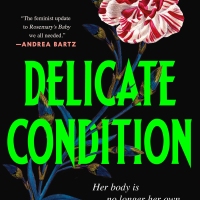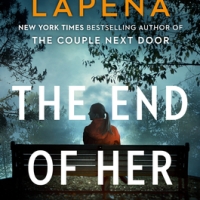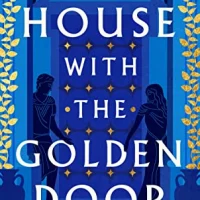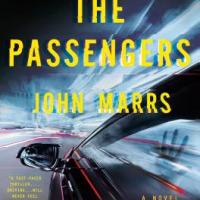#RRSciFiMonth Novella Review: Binti by Nnedi Okorafor
Sci-Fi November is a month-long blog event hosted by Rinn Reads and Over The Effing Rainbow this year, created to celebrate everything amazing about science fiction! From TV shows to movies, books to comics, and everything else in between, it is intended to help science fiction lovers share their love and passion for this genre and its many, many fandoms.
A review copy was provided by the publisher in exchange for an honest review. All opinions are my own.
Genre: Science Fiction
Series: Stand Alone
Publisher: Tor.com (9/22/15)
Author Information: Website | Twitter
Mogsy’s Rating: 3 of 5 stars
When Tor.com first announced their line-up of novellas for 2015, Binti was probably one of the top three I was most excited about. Now I have to wonder if I went overboard and hyped myself up too much, because it turned out that I did not fall in love with this book like I had hoped I would. Now don’t get me wrong, because I enjoyed Binti. It’s a sweet little novella that captivated me and left me wanting more. Still, why it left me wanting more is the key matter I want to discuss in my review.
At its heart, Binti is a very human story about self-discovery and self-acceptance. It follows the eponymous protagonist, a young woman who is leaving home for the very first time. Her people the Himba are a very private society with a deep respect for tradition and culture, preferring to keep to themselves. Binti, however, has bigger plans. She applies for Oomza University and is accepted, becoming the first ever Himba to be offered a place at the school. Binti’s family and friends laughed at her, ridiculed her, cried and begged her not to go, but Binti would not be dissuaded. She secretly books passage for a space flight that would take her to the university, where she would embark on a journey to higher learning.
On the way, however, her ship is attacked by members of an alien race called the Meduse. The Meduse hate humans, and they also hate the University for committing a grave crime against their chief. Binti is forced to watch in horror as all the new friends she made are ruthlessly slaughtered. Somehow, Binti herself manages to escape the massacre. She doesn’t know why she was spared, though she suspects the answer to that question and her only chance to survive might be found within her. She must stay alive until help can be reached, and to do that, she will have to open herself to an unlikely ally.
As a protagonist, Binti is delightfully complex, being a heroine who straddles two worlds. Unlike the other members of her family, Binti has the desire to travel beyond the stars, and the moment she found out about Oomza University, it became her dream to one day study there. That said, she also has deep ties to the Himba, adhering to their many customs, like using the clay of her land on her skin and hair as part of a cleansing ritual, or following in her father’s footsteps to study and develop technology. Leaving home is never easy, and I admired Binti’s courage to face down the new and the unknown, even when she is met with ignorance from other travelers who have never encountered a Himba before and treat her differently—at best, like an oddity; at worst, like a savage.
What’s interesting is that Binti’s own experience with the Meduse teaches her something about the way people view the world, revealing how one can become prejudiced when faced with prejudice against themselves. The theme of the story is about acceptance, of embracing your own identity and being proud of who you are, but also learning to respect others and sympathize with different points of view.
If that sounds like a very straightforward message, that’s because it is. It’s a beautiful message, one I really liked, but at times I felt it was presented a bit too cleanly. And while I have nothing but good things to say about the world building and the establishment of the premise, when it came to the narrative itself, I felt the plot lacked substance. It’s fine, perhaps, if you view this as Binti’s personal journey. But as much as I enjoy a story with a message, I also prefer it when the latter is balanced with the former to make the experience more meaningful and convincing. I was fully engaged for most of this book, but felt the resolution was too rushed and roughly sketched, like the story just couldn’t wait to make its point.
Like I said, I wanted more—mainly more meat on the bones of this story, and to a lesser extent, more emphasis given to Binti’s own skills and intelligence, because I also felt the ending was weak due to the heavy reliance on factors outside the protagonist’s sphere of control. Still, all in all I am glad I read this novella. It was a thought-provoking tale, and I’m blown away by Nnedi Okorafor’s talent for world building. I think it’s high time I picked up one of her novels because I think a fuller story would work better for me.














I’m curious to read this now, because I’ve read several five star reviews. I thought Lagoon had some interesting depth to it, so maybe the shorter format isn’t working as well for her?
LikeLike
Don’t get me wrong, it was a fine book! I do prefer more of a balance between message and story in my reading though, especially since this one started so well but the ending felt inexplicably rushed.
LikeLike
It’s true, sometimes when the message is too “clean” it almost feels like preaching….but I’m still going to try my hand at reading Binti, if only to see a glimpse of the fabulous world-building which I’ve been reading about 🙂
LikeLike
I didn’t love the fact that this story was more message than plot, though to be fair I didn’t get too much of the “preachy” feel from this, possibly because the message itself is so straightforward. It’s like a lesson most of us already know is a good one to learn.
LikeLike
Oh no, never hype yourself up
LikeLike
Oh you know, sometimes you just can’t help it!
LikeLike
That’s a problem I have sometimes with shorter fiction. It’s hard sometimes to feel like there’s enough depth to the story. It looks like her longer fiction often takes place in Africa which would be very interesting.
LikeLike
It’s my BIGGEST struggle with short fiction. Most of my issues usually come down to not enough depth either in the story or characters.
LikeLike
What you wrote made me think that if this had been a full-length novel, story and characterization might have been more balanced in respect of the message, and it would have worked better. Just some time ago I was reading a review about another “book with a message” and the reviewer complained about the message’s interference with the narrative: sometimes writers feel so strongly about an issue that their creation takes second place.
This said, this is one of those authors I need to read, and this novella could be a good starting point…
LikeLike
I think the interference here was the sidelining of the plot and characters in order to make the message, especially the ending. I really enjoyed the book until that point, and it felt like Binti wasn’t in control of much of her situation but still managed to triumph, i.e. too much deus ex machina.
LikeLike
I think a major difference between a short story and a novella, is the amount of room for plot an author has. With the Almanac, they are short stories, all around 10 pages; there isn’t much space to build up a thick and complex plot, and the focus a lot of time is character and message. With novellas though, being much longer than short story and just under a novel, the author has that extra space to add some layers to every aspect of the story, and because of that, it can feel like something was left out or that more could have been added.
I think of Sunset Mantle, great as it was, I felt it could have been better if were wrote as a novel. Not that it was bad, but it felt like a condensed novel, not an expanded(?) short story. Sounds similar to what happened to you with Binti.
LikeLike
I think I can enjoy a short story or two, but after a while the fatigue of not having a fuller story or more developed characters sets in and that’s why I can’t do anthologies. I admit I’m feeling slightly burned out now from the 20-something stories in Press Start to Play, I can’t imagine how it would be like if I read the Time Traveler’s Almanac! I’d probably have to stretch that out over a year 🙂
And I agree with you on Sunset Mantle, it would have made for a fantastic full length novel. Still, for what it is, I thought the author pulled it off marvelously.
LikeLike
I agree with aaaaall of this, pretty much. Especially the thing about it not really relying on her skills. It felt less satisfying because really, her survival was luck.
LikeLike
Yes! Thanks for pointing that out, because I was trying to figure out how to explain. That Binti prevailed because of “Luck” over “Skill” is exactly right.
LikeLike
Pingback: Mogsy’s Bookshelf Roundup: Stacking the Shelves, NaNoWriMo, Recent Reads | The BiblioSanctum
I enjoyed your review because I just read another which was enthusiastic about everything in the story. It’s nice to read different opinions 🙂
LikeLike